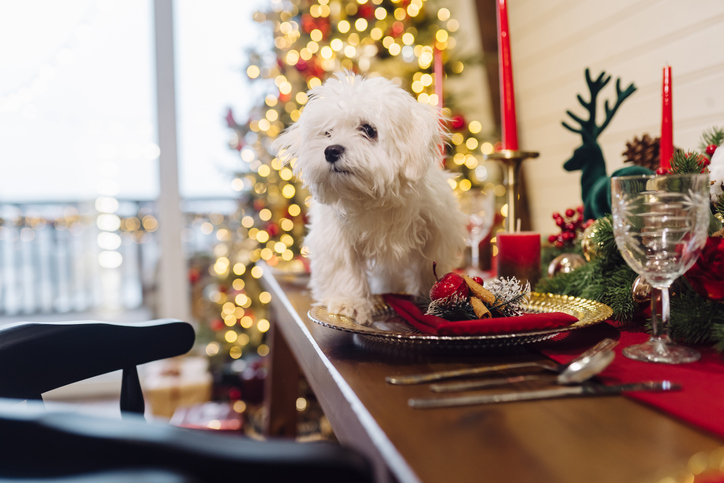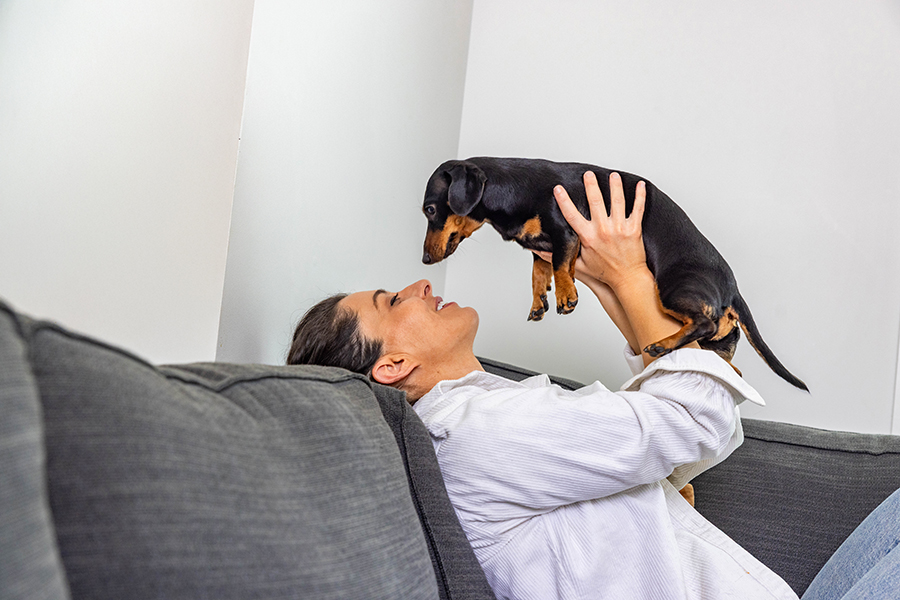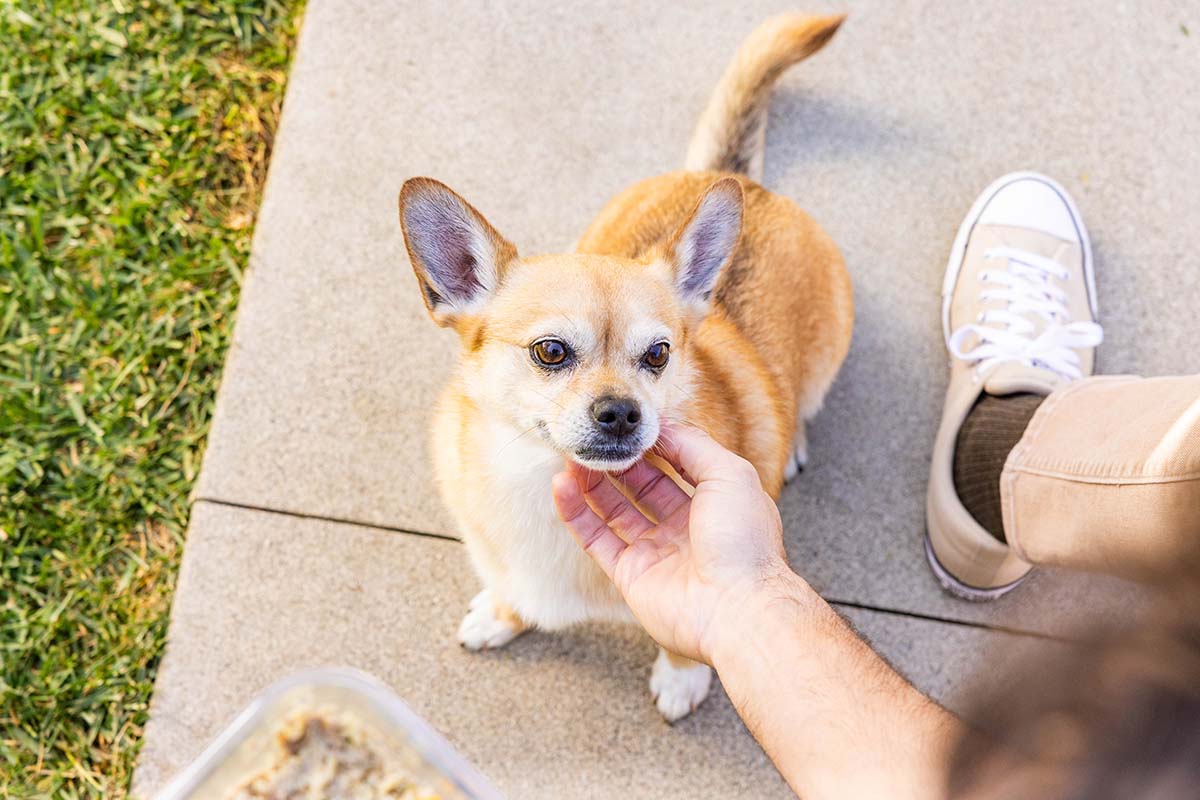Top 5 Holiday Hazards for Pets
Amidst all the excitement and holiday cheer, it’s important to be mindful of the potential hazards that can pose a threat to our pets.
The holiday season is a time for festive decorations, delicious treats, and quality time spent with loved ones, including our pets. However, amidst all the excitement and holiday cheer, it’s important to be mindful of the potential hazards that can pose a threat to our pets.
From toxic foods to dangerous decorations, there are several risks to be aware of during the holiday season. In this blog post, we’ll discuss the top five holiday hazards for pets to help you keep them safe and healthy throughout the holiday season.
1. Traditional Holiday Foods
Tis the season … for pancreatitis! The pancreas is a small digestive organ that helps pets digest fats, among other things. Feeding your pets fatty holiday foods can send them to the veterinary hospital with acute pancreatitis (inflamed pancreas). If left untreated, your pet may not survive this preventable occurrence.
During the holidays, we feast on wonderful and tasty traditional dinners that can include: turkey, pork, pot roasts, etc. As we enjoy these meals, we usually create leftovers and table scraps that are made up of the fatty trimmings of these meats. We feel bad that our pets did not enjoy the meals with us, and we want to include them, so we offer them these trimmings, as treats. Please do not do this!
Unfortunately, the days after Thanksgiving, Christmas, and even New Year are busy times at pet hospitals as the wards fill with cases of acute pancreatitis. Our pets’ pancreas can become inflamed trying to digest the extremely high-fat treats that these trimmings represent. Please avoid this all too common, well-intended, and completely preventable holiday mistake.
2. Alcohol & Chocolate
Watch out for chocolate, raisins, xylitol, bones, macadamia nuts, and alcohol – these are common holiday foods that are for humans only! Bones can splinter and cause severe intestinal damage.
Chocolate contains theobromine and caffeine, which can be potent stimulants to pets, causing severe stomach upset, vomiting, diarrhea, excessive drooling, agitation, increased heart rate, tremors, seizures, and even death.
Dogs are the most common victims, as their cases outnumber feline cases 5 to 1, according to the Pet Poison Helpline. The effects of chocolate toxicity vary depending on the type of chocolate and the amount ingested. The purest, darkest chocolate is the most toxic. The following is a good general guideline of toxicity, from most to least toxic: cocoa powder, unsweetened bakers chocolate, semi-sweet chocolate, dark chocolate, and milk chocolate. The size of your pet also matters, and smaller dogs are more susceptible.
Raisins and grapes can cause kidney failure in dogs and we really don’t understand why, so please avoid these.
Xylitol can be an extremely potent, life-threatening toxin. It is an artificial sweetener found in gum, mints, candies, and even peanut butter! Keep any holiday treats or human foods that contain xylitol out of reach.
Pets don’t drink alcohol, but cats and dogs can still be poisoned by it! Rum cake, alcohol-laced desserts, and even unbaked bread dough can be dangerous to the digestive tract. Unbaked bread dough will ferment in a dog’s stomach, which can lead to bloat and alcohol poisoning.
3. Decorations
Decorations, candles, tinsel, pine needles, fertilizers from Christmas tree water, potpourri, and ornaments look great in the home but can cause damage if knocked over or ingested.
Cats are particularly attracted to shiny, dangling things that they may perceive as toys. They may start off playing with tinsel and end up swallowing; it has been known to entangle the intestines and cause obstructions. Puppies are sometimes just as curious and playful as cats and can also be affected by this choking hazard.
Potpourri and essential oils might smell nice to us, but to pets with extremely sensitive senses of smell, it can be overwhelming! It contains toxic oils and ingestion of dry potpourri can cause vomiting or damage to the mouth and esophagus. Ingestion of hot liquid potpourri can cause painful burns and ulceration of the esophagus and stomach.
Ornaments can break or be ingested, causing intestinal blockage or sharp shards to damage the intestines. Plastic ornaments can be less hazardous than glass ones.
4. Electrical cords
Electrocutions are much more common around holiday parties, so please be careful with holiday lights. Curious puppies and kittens are usually the victims of electronic holiday decorations. They may be teething, or just generally curious, and chew through cords. Cords and outlets should be out of the reach of your pet’s mouth.
Electrocution injuries can be particularly difficult to identify. They may happen silently or subtly when no one is looking. Unfortunately, the damage has been done and in some cases, Pets’ lungs can fill with fluid many hours after they’ve experienced the electrical shock.
5. Seasonal plants
Holiday plants can be a hazard to curious pets, but you’re not safe simply by avoiding poinsettias. In fact, poinsettias are relatively harmless; the worst that may happen might be an upset tummy. Many more toxic plants include mistletoe, bittersweet, holly, lilies, laurel, and amaryllis.
Clinical signs of toxicity can vary from vomiting and diarrhea to extreme lethargy, weakness, convulsions, or death. The list of poisonous plants can be long, but the ASPCA provides a good resource.
Even fake plants aren’t always pet-safe. Keep these out of reach to avoid a trip to the hospital.
Holiday Safety Tips
As the holidays approach, pet owners must be especially vigilant when it comes to our four-legged family members. Typical holiday foods and decorations can present a minefield of dangers to your pet.
With these pet safety tips, you can keep your furry friend safe this holiday and avoid potential disaster. Talk to your DVM if you have any other holiday concerns.
If you think that your animal is ill or may have ingested a poisonous substance, contact your local veterinarian or our 24-hour emergency animal poison control directly at 1-888-426-4435.








